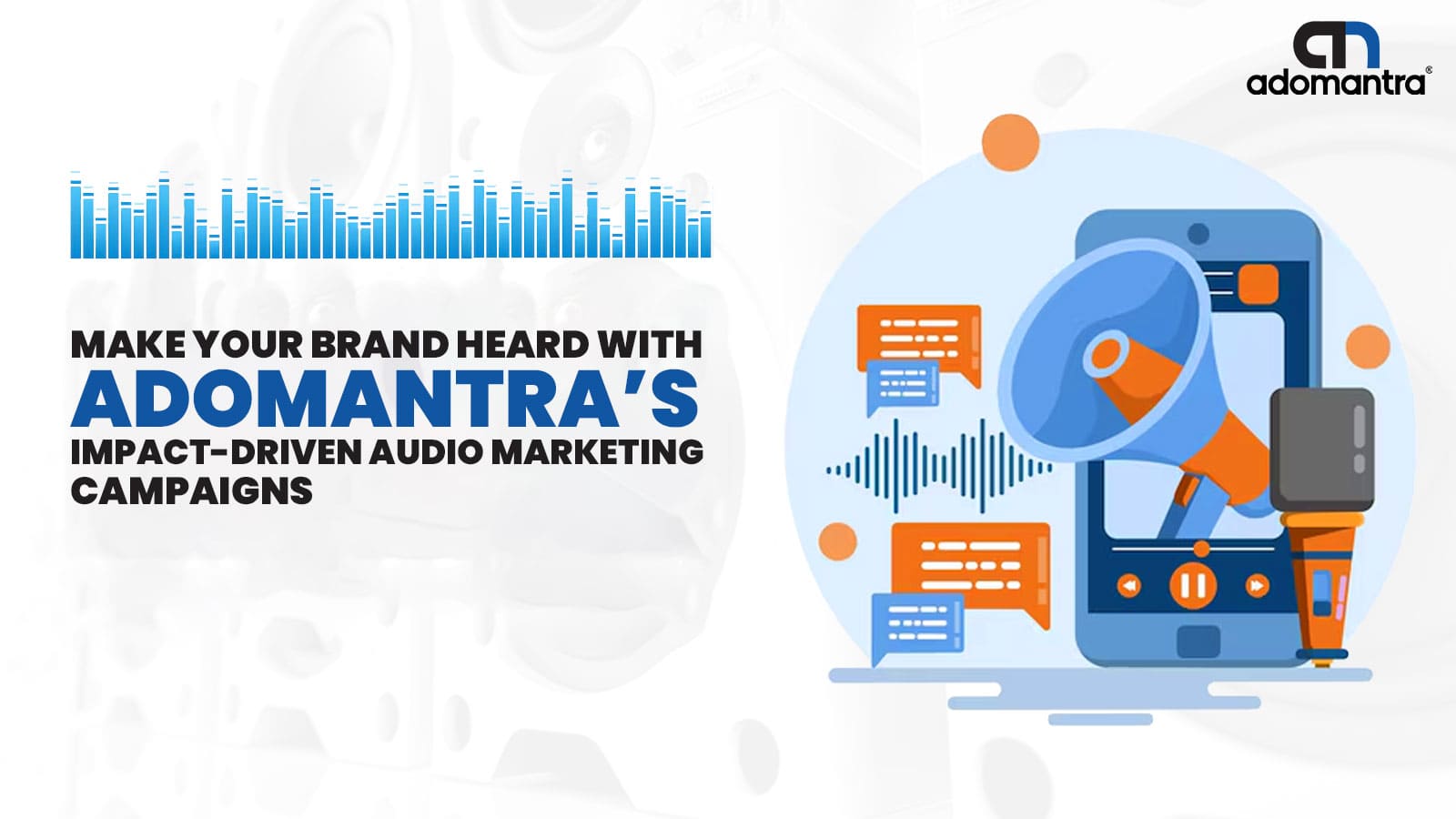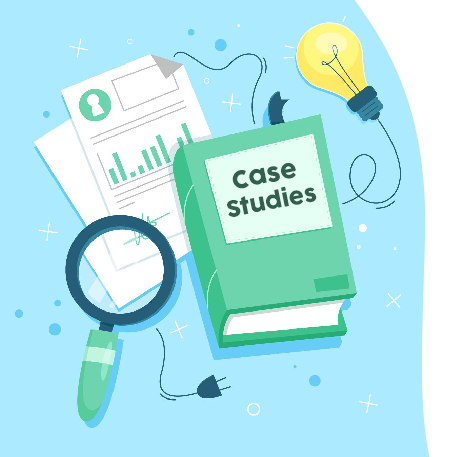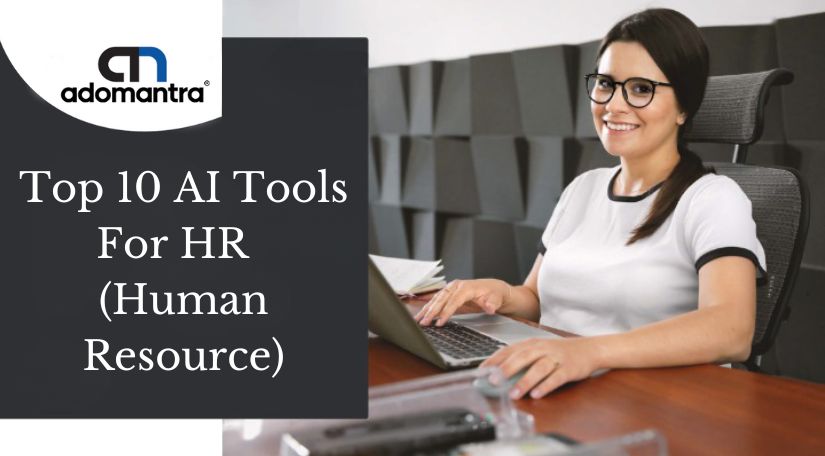
Top 10 AI Tools For HR (Human Resource)
In today's fast-paced business environment, the Human Resources (HR) department plays a critical role in managing a company's most valuable asset – its employees. To enhance efficiency and make data-driven decisions, HR professionals are increasingly turning to Artificial Intelligence (AI) tools. These innovative technologies streamline various HR processes, from recruitment and employee onboarding to performance management and talent retention. By automating mundane tasks and offering valuable insights, AI tools empower HR teams to focus on strategic initiatives and create a more engaging and productive work environment. In this article, we will explore the top 10 AI tools that have revolutionized the HR landscape and how they benefit organizations and their workforce.
Top 10 AI Tools For HR (Human Resource)
- IBM Watson Talent
- SAP SuccessFactors
- Textio
- Mya
- Humu
- Eightfold AI
- Ideal
- XOR AI
- Visage Technologies
- DeepSense AI
IBM Watson Talent
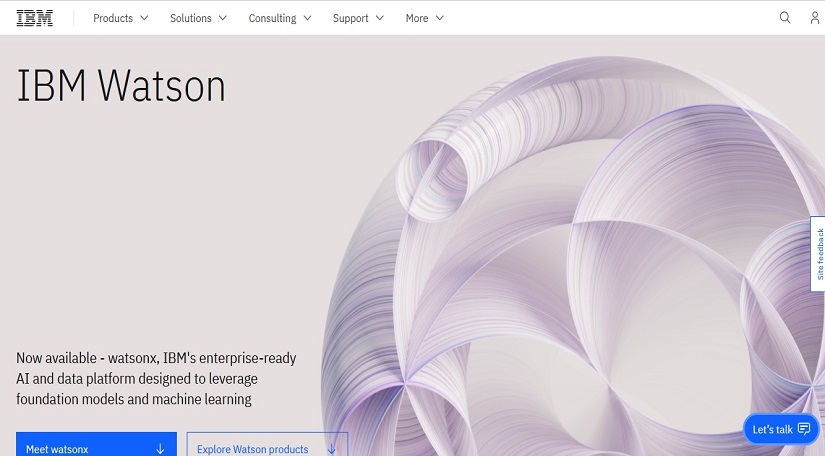
IBM Watson Talent is an AI-powered platform designed to streamline talent management processes in the HR industry. Leveraging advanced natural language processing and machine learning capabilities, the tool offers comprehensive solutions for recruitment, employee engagement, performance management, and skill development. IBM Watson Talent enables organizations to make data-driven decisions, identify top talent, and improve workforce efficiency. The platform's AI-driven insights help HR professionals optimize their strategies and foster a more inclusive and diverse work environment.
Key Features: IBM Watson Talent boasts an array of key features, including:
- Cognitive Recruitment: Identifying suitable candidates through the analysis of resumes, social media profiles, and online data.
- Skill Gap Analysis: Assessing employees' skill levels and identifying areas for improvement or training.
- Predictive Analytics: Anticipating workforce needs and trends to develop effective HR strategies.
- Performance Management: Providing continuous feedback to employees, fostering growth and development.
- Employee Engagement: Measuring and enhancing employee satisfaction and productivity.
- Succession Planning: Identifying potential leaders and planning for future leadership roles.
- Learning and Development: Recommending personalized learning paths to employees.
Types of AI tools for the HR industry: AI tools for the HR industry can be broadly categorized into three types:
- Recruitment AI Tools: These tools help streamline the hiring process by analyzing resumes, conducting candidate assessments, and using AI-driven algorithms to match the right candidates with suitable job roles.
- Employee Engagement and Performance AI Tools: These tools focus on enhancing employee experience, measuring engagement levels, and providing insights to improve performance management processes.
- Talent Development AI Tools: These tools assess employees' skills, identify skill gaps, and recommend personalized learning paths to foster continuous learning and development.
SAP SuccessFactors
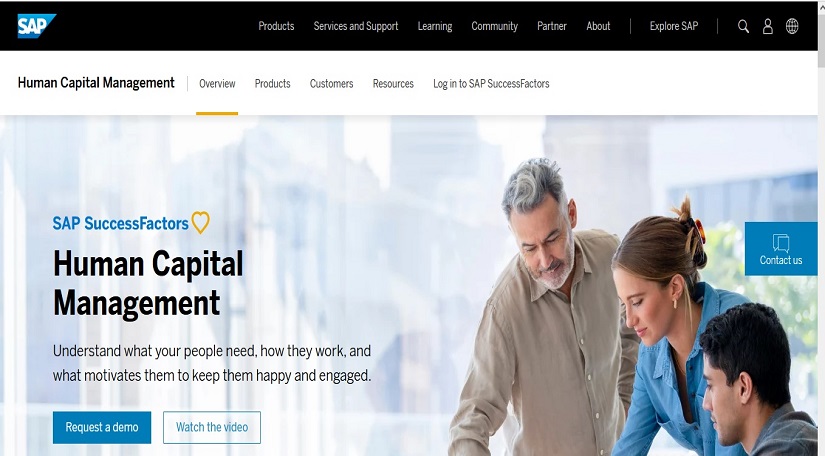
SAP SuccessFactors is a leading cloud-based human capital management (HCM) solution powered by AI. It encompasses a wide range of HR functions, such as talent acquisition, performance management, learning and development, and employee engagement. SAP SuccessFactors leverages AI to provide HR professionals with actionable insights, enabling them to make data-driven decisions and create a more agile and productive workforce. The platform's seamless integration with other SAP modules and third-party applications ensures a holistic HR management experience for organizations.
Key Features: Some key features of SAP SuccessFactors include:
- Recruiting and Onboarding: AI-powered candidate sourcing, matching, and personalized onboarding experiences for new hires.
- Performance and Goal Management: Continuous performance evaluation, goal setting, and feedback to drive employee development.
- Learning and Development: AI-driven recommendations for personalized learning content and development plans.
- Employee Central: A central database for employee information, enabling HR professionals to manage personnel data efficiently.
- Workforce Analytics: AI-powered analytics for workforce planning, diversity, and inclusion, helping HR teams identify trends and take proactive measures.
- Succession and Career Development: Identifying potential candidates for future leadership roles and creating career development plans.
Types of AI tools for the HR industry: AI tools in the HR industry can be classified into various categories:
- Chatbots and Virtual Assistants: AI-powered chatbots like Mya automate candidate engagement, answer queries, and schedule interviews, enhancing the recruitment process's efficiency.
- Predictive Analytics Tools: These tools analyze historical HR data to predict employee turnover, performance, and engagement, aiding in workforce planning and talent retention.
- Sentiment Analysis Tools: AI-driven sentiment analysis tools gauge employee sentiments through surveys, feedback, and social media to assess overall employee satisfaction and well-being.
- AI-Driven Learning Platforms: These platforms recommend personalized learning content and development paths based on employee skills, preferences, and performance data.
- Performance Management Systems: AI tools for performance management offer real-time feedback, goal tracking, and performance predictions to drive continuous improvement.
Textio
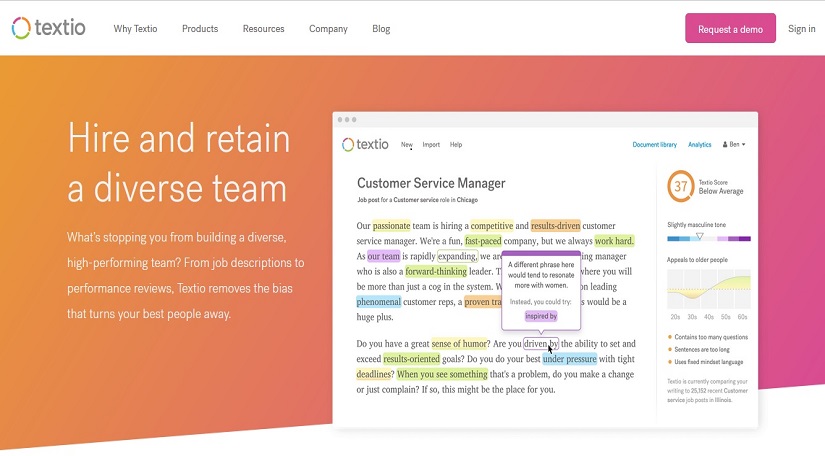
Textio is an AI-powered writing platform designed to optimize job listings and other HR-related written content. Leveraging natural language processing and machine learning, Textio helps organizations create more inclusive, engaging, and effective job postings. The tool analyzes the language used in job descriptions and suggests improvements to attract a diverse pool of candidates and reduce unconscious bias. By providing real-time feedback, Textio enables HR professionals to craft compelling and inclusive messages, resulting in better candidate matches and improved recruitment outcomes.
Key Features: Some key features of Textio include:
- Inclusive Language Analysis: Textio identifies potentially biased language in job descriptions and provides suggestions to make the language more inclusive and appealing to diverse candidates.
- Real-time Guidance: As HR professionals write or edit job postings, Textio offers real-time suggestions and insights to enhance the content's overall effectiveness.
- Data-Driven Insights: The platform provides data-driven insights based on past performance metrics, enabling HR teams to make informed decisions about their job posting strategies.
- Candidate Matching: Textio uses AI to predict how well a job posting will resonate with potential candidates, helping recruiters tailor their approach and improve candidate attraction.
Types of AI tools for the HR industry: AI tools in the HR industry span a wide range of applications and functionalities:
- Resume Screening AI Tools: These tools automate resume screening and shortlisting processes, saving time and effort for HR teams and ensuring fair and efficient candidate evaluation.
- Interview AI Tools: AI-powered interview platforms use natural language processing and sentiment analysis to assess candidates' responses and predict their suitability for the role.
- Performance Feedback AI Tools: These tools facilitate continuous performance feedback and analysis, aiding in employee development and growth.
- Employee Onboarding AI Tools: AI-driven onboarding platforms streamline the onboarding process, providing personalized experiences and reducing administrative burdens.
- Employee Engagement AI Tools: AI tools analyze employee sentiment and engagement levels, enabling HR professionals to take proactive measures to enhance workplace satisfaction and productivity.
Mya
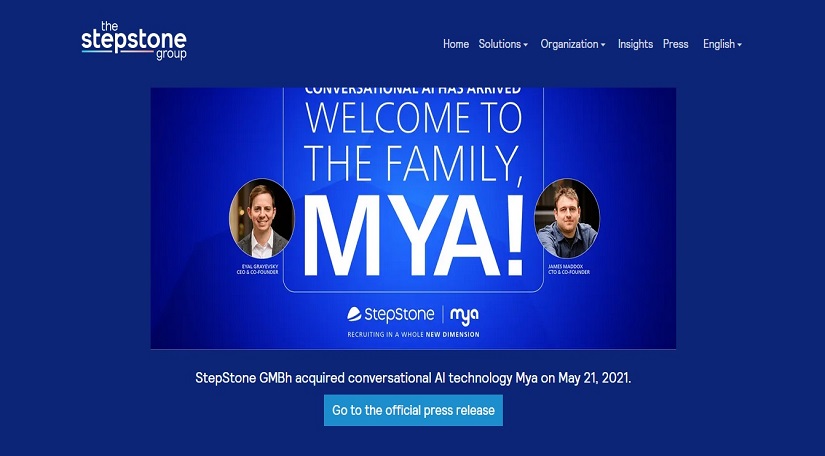
Mya, also known as Mya Systems, is an AI-powered recruitment platform that specializes in candidate engagement and automated recruiting solutions. Mya's AI chatbot is designed to interact with candidates in a conversational manner, answering questions, providing updates, and guiding candidates through the application process. The platform aims to enhance the candidate experience by offering real-time support and personalized interactions, all while freeing up recruiters' time to focus on higher-value tasks.
Key Features: Key features of Mya include:
- Conversational AI: Mya's AI chatbot engages with candidates through text messages or chat interfaces, simulating human-like conversations.
- Candidate Screening: The platform uses natural language processing to screen candidates, assess their qualifications, and recommend the most suitable candidates for further consideration.
- Application Status Updates: Mya keeps candidates informed about their application status, providing timely feedback and reducing uncertainty during the hiring process.
- Candidate Engagement Analytics: The platform tracks candidate interactions and engagement metrics, providing valuable insights to improve recruitment strategies.
Types of AI tools for the HR industry: AI tools in the HR industry cover various aspects of talent management and HR operations, including:
- AI-driven Employee Performance Analytics: These tools use AI algorithms to analyze performance data and identify patterns, helping organizations make informed decisions about employee development and recognition.
- AI-powered Talent Marketplace Platforms: These platforms facilitate internal talent mobility by matching internal candidates with suitable job opportunities within the organization.
- AI for Employee Feedback and Pulse Surveys: AI-driven survey platforms analyze employee feedback and sentiments in real-time, enabling HR teams to take immediate actions to improve engagement and address issues.
- AI for HR Compliance: AI tools can assist with monitoring and ensuring HR compliance with regulations and company policies.
Humu
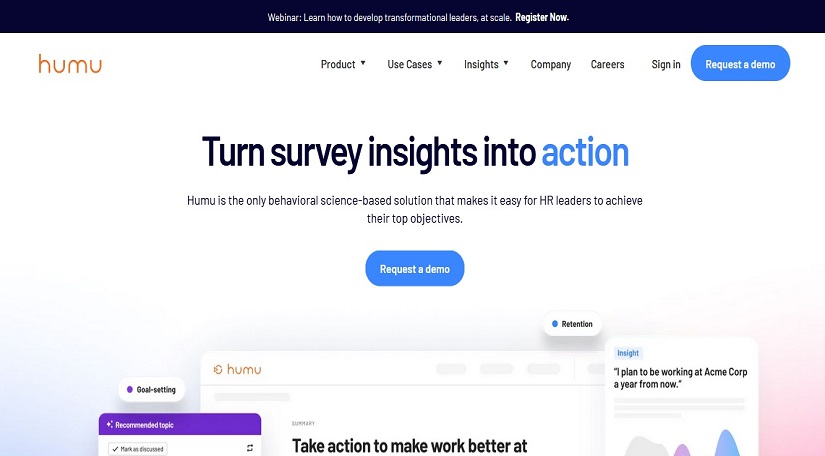
Humu is an AI platform designed to improve employee engagement and well-being in the workplace. The platform uses machine learning algorithms to analyze employee data and deliver personalized nudges to individuals and teams. These nudges are designed to foster positive behavioral changes, increase productivity, and create a more inclusive and supportive work culture. Humu's AI-driven approach helps organizations identify patterns and trends in employee behavior, enabling HR teams to proactively address issues and create a more fulfilling work experience for employees.
Key Features: Key features of Humu include:
- Nudges for Positive Change: Humu sends personalized nudges to employees, encouraging actions that improve well-being, collaboration, and productivity.
- Data Analytics: The platform analyzes large volumes of employee data to identify trends, predict turnover risks, and measure the impact of interventions.
- Inclusivity and Diversity Initiatives: Humu provides actionable insights to create a more inclusive workplace by addressing unconscious biases and promoting diversity.
- Pulse Surveys: AI-driven pulse surveys gather real-time employee feedback, helping HR professionals understand employee sentiments and make data-driven decisions.
Types of AI tools for the HR industry: AI tools in the HR industry are diverse and cater to various HR functions:
- HR Analytics Tools: These tools leverage AI to analyze HR data, providing valuable insights into workforce trends, employee performance, and retention risks.
- Workforce Planning AI Tools: AI-driven workforce planning tools help organizations forecast talent needs, plan succession, and align HR strategies with business objectives.
- Employee Benefits and Compensation AI Tools: AI tools assist in designing optimal compensation packages and benefits tailored to individual employee needs and preferences.
- Learning Experience Platforms (LXP): LXPs use AI to curate personalized learning paths for employees, recommending relevant training content to enhance skills and knowledge.
Eightfold AI
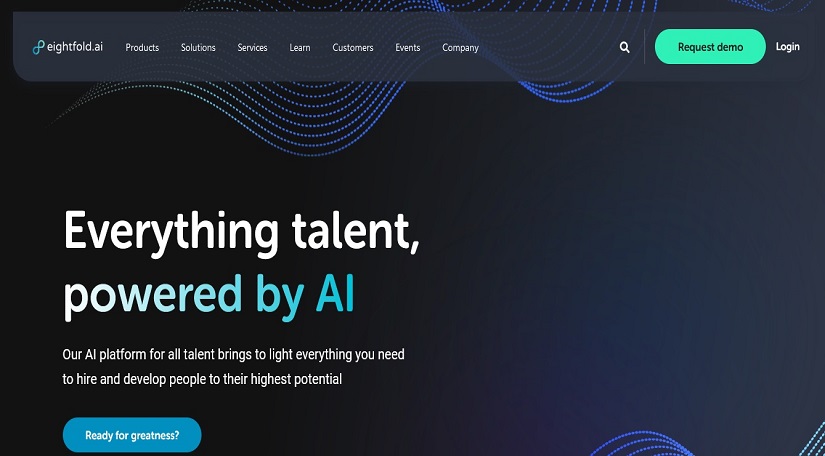
Eightfold AI is an AI-powered talent intelligence platform that aims to revolutionize talent acquisition and management. The platform leverages AI and machine learning algorithms to analyze vast amounts of data from various sources, such as resumes, job descriptions, and performance data. Eightfold AI's mission is to match the right candidates with the right job opportunities, empower employees with personalized career development paths, and enable HR professionals to make data-driven decisions for effective talent management.
Key Features: Key features of Eightfold AI include:
- Talent Marketplace: Eightfold AI creates a talent marketplace where organizations can identify internal talents for suitable roles and facilitate internal mobility.
- Candidate Ranking and Matching: The platform uses AI to rank and match candidates based on their skills, experiences, and cultural fit, streamlining the recruitment process.
- Career Development: Eightfold AI provides personalized career development plans for employees, suggesting relevant learning opportunities and growth paths.
- Diversity and Inclusion: The platform helps organizations promote diversity and inclusion by identifying potential biases in the hiring process and providing insights for improvement.
Types of AI tools for the HR industry: AI tools in the HR industry can be categorized into different types, each serving a unique purpose:
- AI-powered Recruitment Platforms: These platforms use AI to automate candidate sourcing, resume screening, and candidate engagement, leading to more efficient and bias-free hiring processes.
- AI-driven Performance Management Tools: These tools offer continuous performance monitoring and feedback, facilitating fair evaluations and development opportunities for employees.
- AI for Employee Engagement Surveys: AI-powered survey platforms analyze employee feedback, sentiment, and engagement levels to help HR professionals understand workforce satisfaction and take necessary actions.
- AI-driven Learning and Development Platforms: These platforms recommend personalized learning content based on employee skills, preferences, and performance, fostering continuous learning and growth.
Ideal
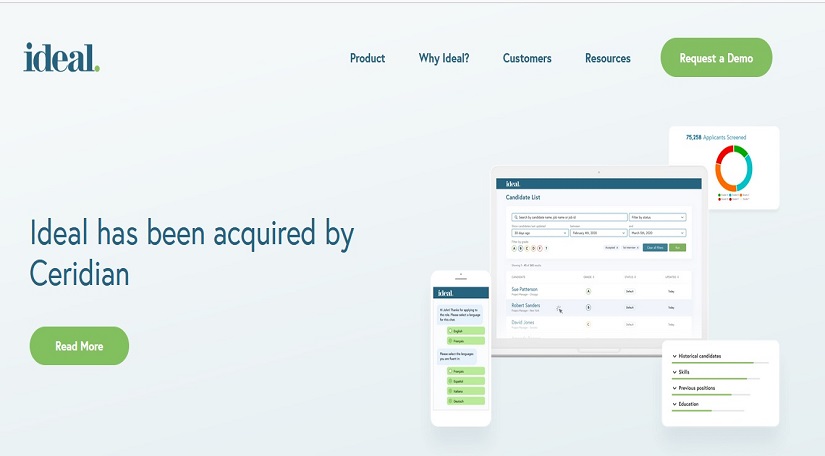
Ideal is an AI-powered recruiting platform that streamlines the hiring process by automating candidate sourcing, screening, and shortlisting. The platform uses advanced algorithms to analyze resumes, assess candidate qualifications, and predict job fit, saving recruiters time and effort in the initial stages of recruitment. Ideal's AI-driven approach aims to remove bias from the hiring process and ensure a fair and diverse pool of candidates for consideration. By empowering recruiters with data-driven insights, Ideal helps organizations make more informed hiring decisions and find the best candidates for their roles.
Key Features: Key features of Ideal include:
- Automated Candidate Screening: Ideal uses AI to screen resumes and match candidates with job requirements, shortlisting the most qualified individuals.
- Bias Removal: The platform helps eliminate unconscious bias by focusing solely on candidate qualifications and skills, promoting diversity and inclusivity.
- Candidate Ranking: Ideal ranks candidates based on their suitability for the role, enabling recruiters to prioritize their efforts on the top candidates.
- Integration with Applicant Tracking Systems (ATS): Ideal seamlessly integrates with existing ATS platforms, enhancing the overall recruitment process.
Types of AI tools for the HR industry: AI tools in the HR industry serve diverse purposes and can be categorized as follows:
- AI-driven Employee Engagement Surveys: These tools use natural language processing to analyze employee feedback and sentiments, providing insights to improve engagement and address workplace issues.
- AI-powered Employee Feedback Platforms: These platforms facilitate continuous feedback and coaching for employees, fostering a culture of learning and improvement.
- AI for HR Analytics: AI-driven HR analytics tools analyze data to identify trends, predict attrition, and improve workforce planning and decision-making.
- AI Chatbots for HR: AI chatbots assist employees with HR-related queries, such as leave requests, benefits inquiries, and policy information, enhancing the overall employee experience.
XOR AI
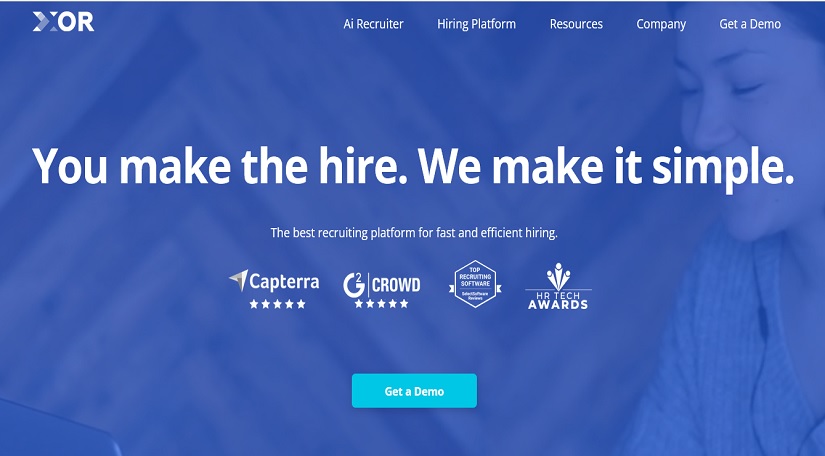
XOR AI is an AI-powered recruitment automation platform that aims to simplify and accelerate the hiring process. The platform uses chatbots and conversational AI to engage with candidates, answer their queries, and schedule interviews. XOR AI streamlines candidate communication and improves candidate experience by providing real-time responses and timely updates. By automating routine tasks, XOR AI allows recruiters to focus on more strategic aspects of recruitment, leading to faster hiring cycles and better candidate engagement.
Key Features: Key features of XOR AI include:
- Chatbot-Assisted Candidate Engagement: XOR AI's chatbot engages with candidates in real-time, answering questions, and guiding them through the application process.
- Automated Interview Scheduling: The platform autonomously schedules interviews with candidates, reducing the back-and-forth communication between recruiters and candidates.
- Resume Parsing and Screening: XOR AI uses AI algorithms to parse resumes, extract relevant information, and screen candidates based on job requirements.
- Candidate Relationship Management: XOR AI maintains a database of candidate interactions, ensuring personalized follow-ups and continuous communication.
Types of AI tools for the HR industry: AI tools in the HR industry are highly diverse and cater to various HR functions, including:
- AI-powered Talent Acquisition Platforms: These platforms automate various stages of the recruitment process, from candidate sourcing and screening to interview scheduling and offer management.
- AI-driven Employee Benefits and Rewards: AI tools analyze employee preferences and performance to recommend tailored benefits and rewards, increasing employee satisfaction and retention.
- AI for Employee Performance Analysis: These tools use AI to track and evaluate employee performance, helping identify top performers and areas for improvement.
- AI-driven Learning Management Systems: These systems use AI to recommend relevant training and development opportunities to employees based on their skills and career aspirations.
Visage Technologies
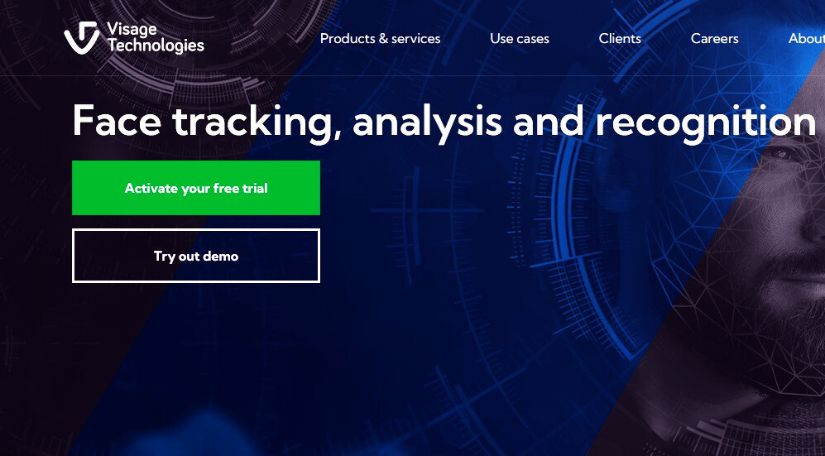
Visage Technologies is an AI-based software company that specializes in facial recognition and analysis. While not exclusively an HR tool, Visage Technologies' AI capabilities have found applications in the HR industry. Their facial recognition technology can be used for attendance tracking, employee identification, and access control. Additionally, the platform can analyze facial expressions to gauge emotions during job interviews or employee interactions, providing valuable insights into engagement and satisfaction levels.
Key Features: Some key features of Visage Technologies include:
- Facial Recognition: The platform can accurately recognize and identify individuals based on their facial features, enabling streamlined attendance tracking and access control.
- Emotion Analysis: Visage Technologies' AI can analyze facial expressions to determine emotions, which can be valuable for gauging candidate reactions during interviews or assessing employee engagement levels.
- Data Security: The platform prioritizes data security and ensures that facial data is stored and processed securely, complying with privacy regulations.
Types of AI tools for the HR industry: AI tools in the HR industry serve diverse purposes, and some other types include:
- AI-driven Employee Surveys: These tools use AI to analyze employee survey responses, uncover patterns, and identify areas for improvement in the workplace.
- AI for Performance Reviews: AI-powered platforms can facilitate performance reviews by gathering feedback from multiple sources, providing comprehensive insights into employee performance.
- AI-driven Workforce Management Systems: These systems leverage AI to optimize workforce scheduling, resource allocation, and workload distribution for improved efficiency.
- AI for Employee Onboarding: AI tools can streamline the onboarding process by automating tasks, providing new hires with essential information, and guiding them through the orientation process.
DeepSense AI
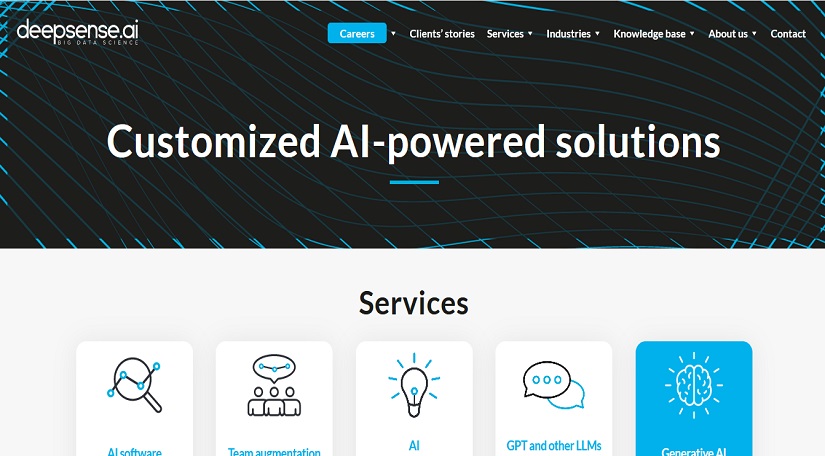
DeepSense AI is an AI-powered platform that focuses on employee sentiment analysis and engagement. The platform uses natural language processing (NLP) and machine learning algorithms to analyze employee feedback, communication, and sentiment across various channels, such as emails, chat messages, and surveys. DeepSense AI helps HR professionals gain valuable insights into employee well-being, job satisfaction, and overall sentiment within the organization. By understanding employee sentiments, organizations can take proactive measures to improve workplace culture, address concerns, and enhance employee engagement.
Key Features: Key features of DeepSense AI include:
- Sentiment Analysis: The platform uses AI to analyze written communication and derive employee sentiment, such as positive, negative, or neutral, providing an overall sentiment score.
- Employee Well-being Monitoring: DeepSense AI can detect signs of employee burnout, stress, or dissatisfaction, enabling HR teams to intervene and provide support.
- Employee Feedback Analytics: The platform aggregates and analyzes employee feedback from various sources, helping HR professionals identify recurring themes and address issues effectively.
Types of AI tools for the HR industry: In addition to the aforementioned AI tools, other types of AI tools for the HR industry include:
- AI-driven Talent Management Systems: These systems use AI algorithms to match candidates' skills with job requirements, ensuring better job-fit and reducing time-to-fill for open positions.
- AI for Employee Benefits Management: AI-powered tools can analyze employee preferences and usage patterns to tailor benefits packages and improve overall benefits management.
- AI-driven Employee Performance Improvement: AI tools can assist in identifying skill gaps, suggesting training programs, and monitoring progress to enhance employee performance.
- AI for Employee Exit Analysis: AI can analyze exit interview data and identify common reasons for employee turnover, helping HR teams devise strategies to improve retention.
Conclusion
The HR industry has experienced a significant transformation with the widespread adoption of AI-powered tools and technologies. These innovative solutions have revolutionized talent acquisition, management, and engagement, enabling HR professionals to make data-driven decisions and create more inclusive and productive work environments.
AI tools like IBM Watson Talent and SAP SuccessFactors offer comprehensive talent management solutions, providing insights for better recruitment, performance management, and employee engagement. Textio and Ideal focus on optimizing job postings and candidate screening, eliminating biases and improving the hiring process's overall effectiveness. XOR AI and Humu streamline candidate engagement and employee well-being, respectively, through AI-driven chatbots and personalized nudges.
Moreover, the types of AI tools in the HR industry are diverse and cater to various HR functions. From recruitment and performance management to employee engagement and learning and development, AI is present at every stage of the HR lifecycle, enhancing efficiency and effectiveness. As AI technology continues to advance, HR professionals can expect even more sophisticated and intelligent tools to further optimize HR processes and improve the employee experience. Leveraging these AI-powered tools, organizations can attract and retain top talent, foster a culture of continuous learning, and drive overall business success.
Ultimately, the integration of AI in the HR industry has become a game-changer, empowering HR professionals to be more strategic, data-driven, and proactive in their talent management approaches, leading to a more engaged, motivated, and high-performing workforce.

